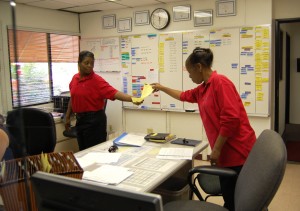Three-day-out scheduling makes Coach America a smooth operator
By Bethanie Hestermann

An effective dispatch department can keep a motorcoach operation feeling less like a circus, and more like a well-oiled machine. As a central hub of an operation, dispatch is like the ringleader, capable of taming the beast—or at least keeping the chaos organized, and putting out fires with quick thinking and problem solving.
Dispatch is responsible for driver scheduling, customer service, driver support and emergency response. The department must serve as a liaison between all other departments, and sustain open lines of communication with sales, clients, drivers and maintenance.
This is no doubt a juggling act. But a finely tuned dispatch department increases profitability by generating return business and promoting driver efficiency.
Fred Siebel, operations manager at Coach America, Phoenix, AZ, describes his dispatch department as the heartbeat of the company, though it has not always been so. The transition from headache to heartbeat began three years ago during a management changeover. The team recognized that daily dispatch was creating a lot of issues, so they put their heads together and came up with a new system that would schedule three days out instead of just one.
Three-day-out dispatch
Opposite the dispatch window where Coach America drivers begin their day, a series of white boards display the company’s “three-day-out” scheduling system for all to see. They call it the honesty board because it is easily accessible, eliminating mystery and encouraging fairness and consistency in scheduling. Since its inception the system has nearly eliminated driver call-outs and absenteeism.
“Three-day-out dispatch gives us the chance to be prepared for upcoming work,” says Siebel. “The extra efficiency benefits all parties involved—drivers, customers and the company as a whole.”
Scheduling three days in advance allows for specific client needs to be met with less scrambling on the day of departure, he says. If a dispatcher notices on Friday that special accommodations need to be made for a run on Monday, the matter can be resolved before ever becoming an issue.

Coach America’s dispatch will even go above and beyond by calling ahead or scouting a location to monitor any road construction or ensure they are sending the right length vehicle. None of this would be possible without the extra time their system allows.
Yolanda Pitchford, dispatch supervisor, says it helps her team to keep a close eye on driver hours, holding dispatchers accountable for following safety regulations in the form of driver hours versus time off. Pitchford says the drivers seem to love the system.
“Daily dispatch doesn’t allow drivers to schedule doctor appointments and make plans,” she says. “Our system gives them an opportunity to arrange their personal lives around work.”
The company generally follows a first-in first-out rotation of drivers, though customer requests and dispatcher overrides based on driver strengths and personalities are exceptions to the rule.
Best practices put to use
Coach America shares some best practices that translate to all dispatch departments, whether they schedule daily or a few days out.
According to Siebel and his team successful dispatchers are organized, well-versed in DOT regulations and capable of making quick decisions. Geographical knowledge is a huge plus.
Siebel says a dispatcher has to be a counselor at times and a psychic at others.
“If a driver calls panicking about wrong directions or a wrong itinerary, it is critical the dispatcher keep their head and work the driver down from the situation,” says Elsie Hervey, weekday dispatcher at Coach America. “The way a driver perceives information is important. You need to get them calm so passengers feel everything is perfectly under control.”
Teamwork is also paramount. Weekend dispatcher Rob Bickford describes how an efficient dispatch department works one step ahead of each other, anticipating the problem based on a few key words in their colleague’s phone call. He says successful dispatchers are able to read each other’s minds to arrive at a solution as quickly as possible.

“Tight communication is the key to success in dispatch,” Bickford says. “Everything starts and ends here; the worst thing for a dispatcher to hear is that no one told the driver.”
Dispatchers: Know thy drivers
To effectively assign drivers and amend runs last minute, the dispatcher must know drivers’ strengths and weaknesses, and be in tune with their preferences and comfort levels for particular routes and customers.
At Coach America dispatchers are also given tools to understand a driver’s job. Training involves light maintenance instruction, making dispatchers perfectly capable of running out to pre-trip a bus or ask key questions during a breakdown situation.
“Most of our dispatchers hold a CDL and have worked closely with DOT and OSHA,” Pitchford says. “We are well-versed in what it takes to drive, what it takes to be a driver, and what it takes to fulfill a client’s needs. This way we are not giving orders that we don’t understand. We are assigning duties that we could do ourselves.”
Randy Hermanson, floating dispatcher and driver with Coach America, stresses that a good dispatch team impacts customers, and therefore, your bottom line.
He says at the end of the day a dispatcher’s main goal is to meet client needs by providing equipment and drivers that are prepared to transport them safely.
“Happy customers are vital,” Siebel says. “Happy customers come back, keeping drivers on the road, dispatchers on the phone, and the company in the black.” BR
